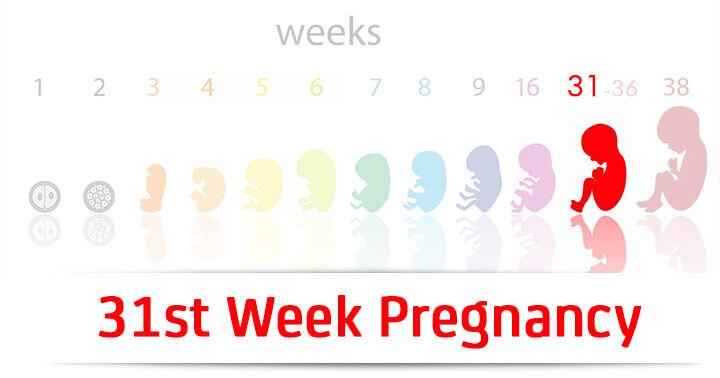31 weeks of pregnancy: your baby is as big as a coconut!!!!

How big is the baby during 31 weeks of pregnancy?
By 31st week of pregnancy, weighing in at 3-plus pounds and measuring about 16 inches long, your baby is quickly approaching his birth length — though he’s got to pack on another 3 to 5 pounds before the delivery day.
The following are the body parts which are being developed during 31 weeks of pregnancy:
- Your baby’s reproductive system continues to develop. In boys, testicles are moving from the kidneys through the groin to the scrotum. In girls, her clitoris is evident, but her labia are still developing to cover it.
- Your baby’s lungs are now more developed but are not completely mature.
- As tons of brain connections grow, your baby is already using all of his/her five senses.
Symptoms you might experience during 31 weeks of pregnancy:
More frequent urination
Your uterus puts more pressure on your bladder in the third trimester, giving it less room to store urine.
Backaches
That burgeoning belly can also do a number on your back as it curves to accommodate the load. If you haven’t by now, now is the time to include some prenatal yoga into your exercise regimen. The stretches will calm your back — and your mind!
Clumsiness
Your shifting posture, your increasing girth and your lack of concentration may make you clumsier these days.
Pregnancy brain
Welcome the mommy-to-be brain — a state that’s a consequence of shrinking brain cell capacity in the third trimester. Don’t worry — your brain cells go back to usual a few months after delivery. Don’t stress out about your foggy memory, since stress just makes it worse. Write things down or program them into your smartphone and delegate responsibility if possible.
Sleep problems
This is one more common third trimester distress, caused by a group of other conditions, such as leg cramps, heartburn, recurrent urination and anxiety, with a surge of pregnancy hormones. If tension keeps you tossing and turning all night, talk it out with friends or your partner during the day.
Occasional headaches
If tension is twisting your head up in knots, try spending a few minutes in a dark, quiet room. If you’re at work, close your eyes and put your feet up for 15 minutes. It’s also generally safe to take acetaminophen occasionally when nothing else seems to relieve the pain.
Body changes observed during this week:
Along with heaviness on your diaphragm from the upper end, your uterus is also pushing against your bladder down on the lower end. As a result, you may feel like you have to urinate frequently. And you may urinate just a little when you sneeze or laugh too hard.
However, this probably won’t be a problem once your uterus stops pushing against your bladder after you deliver. For some women, though, pregnancy’s stress on the pelvic muscles deteriorates those muscles, so a slight incontinence when chuckling or coughing remains after the pregnancy.
Seepage of another kind may also be an issue around week 31. A soft fluid called colostrum can begin to leak from the breasts before and soon after delivery. It’s denser than breast milk, so purchasing some breast pads for inside your bra may be a good idea.
Colostrum may only leak once in a while, or it may never seem to appear during pregnancy. Both conditions are normal. Colostrum discharge is just a sign that your body is getting prepared to deliver and then nurture a new-born baby.
Call the doctor immediately if you observe anyone of the following symptoms:
Braxton-Hicks contractions
You should inform your healthcare provider any time you feel severe pain during your pregnancy. You may start to feel Braxton-Hicks contractions this week. These harmless contractions that occur when the uterus stiffens.
Preeclampsia
Preeclampsia is more likely to grow now that you are further along in the pregnancy, but could happen soon or even, seldom, postpartum. Preeclampsia is a potentially grave pregnancy problem for you and your baby. It can result in damage to your organs, especially the kidneys.
Tests which are conducted during 31 weeks of pregnancy:
Your midwife or doctor will measure the size of your womb and crisscross which way up the baby is at every gynecological visit. They will also measure your blood pressure, test your pee for protein and discuss the results of any screening tests from your previous appointment. If you experience vaginal bleeding or severe itching, see your doctor immediately.
Foods that should be consumed during 31 weeks of pregnancy:
1. Fish
2. Red Meat
3. Bananas
4. Dairy Products
5. Leafy Vegetables
6. Peanut Butter
7. Oranges
Foods that should be avoided during pregnancy:
1. Unpasteurised Milk
2. Coffee
3. Alcohol and Tobacco
4. Fried Foods
5. Shark, Marlin, and Swordfish
6. Liver and Cured Meats
7. Soft Cheese
Drugs that should be avoided during pregnancy:
Several medicines may damage your baby if you have them when you are pregnant. Avoid taking any medicines, herbs, vitamins, or supplements without first discussing with your healthcare provider. Never use banned or street drugs (such as marijuana or cocaine) during pregnancy.


Leave a Reply